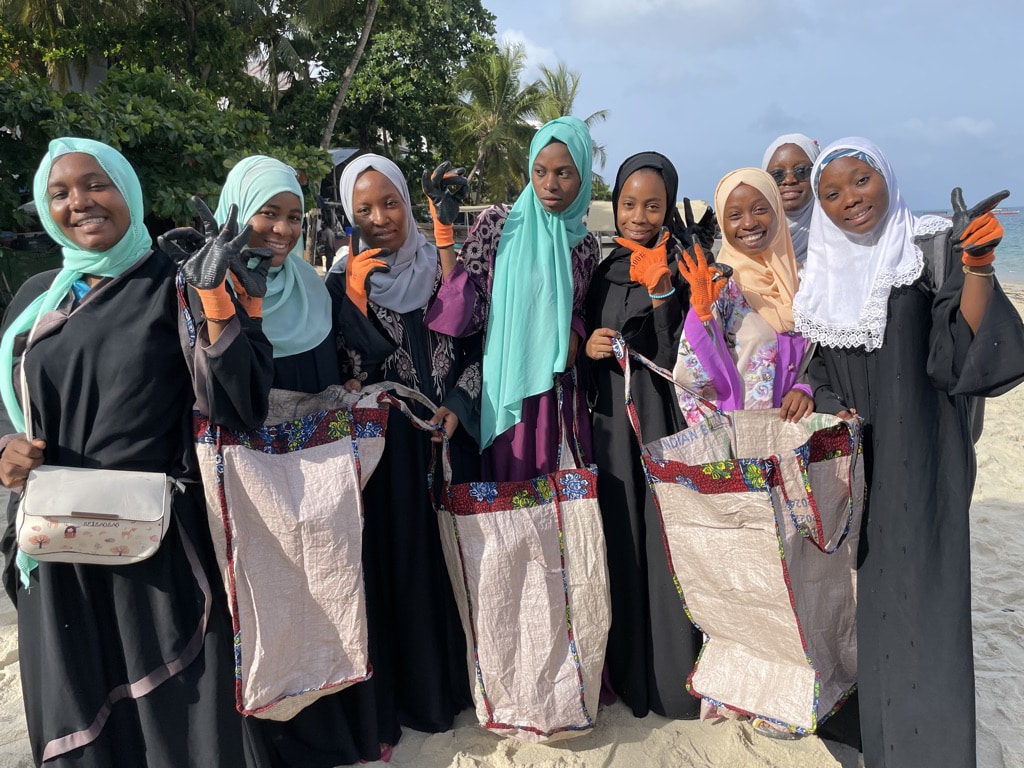
Beach clean-ups pay school fees
The Kawa Training Center has educated more than 1000 tour guides, receptionists and chefs over the years. “We’ve got an army out there”, says director Suzanne Degeling.
The Kawa Training Center has educated more than 1000 tour guides, receptionists and chefs over the years. “We’ve got an army out there”, says director Suzanne Degeling. The day is still young, the air crispy. Along the city beach of Zanzibar, where Livingstone dwellers will have their sundowners in the evening, young men and women, wearing gloves and carrying recycling bags, slowly scan the sand for plastic and other waste that the sea and careless humans have left behind. They are earning their school fees that way. But assuming they’d dislike their morning duty would be an error. To the contrary: “We enjoy starting our day like that”, one of the girls says who wants to become a receptionist. Ibrahim, dreaming of a position as a chef, agrees: “It teaches you about life and the environment. It clears your mind.” Their self-made recycling bags have three chambers; one for fabrics, flip-flops and other reusable leftovers, which they will turn into earrings and doormats at their own upcycling station; one for “gold” as the teacher calls sellable plastic caps of water bottles, and one for simple waste. Rubbish bins and containers for plastic and “Konyagi” bottles - a popular cheap drink in Zanzibar - have been deployed along a four kilometre stretch of beach from the ferry port to Kilimani with the help of the Kawa institute. 60 students collect around 300 kilogrammes of waste. Every day.
They study housekeeping, cooking, accounting, tour guiding and other entrepreneurial skills mainly for the tourism sector. The courses last 15 months. Part of the school fees – TZS100,000 or $40 monthly – are waived against the beach cleaning. Director Suzanne Degeling, who founded the Kawa Training Centre in 2010, has brought her dog along today and says, she continues the green morning exercise even on Sundays: “It’s somehow addictive.” But then, Dutch-born Degeling, a tall and slender woman of words more than of deeds, is not your typical social worker either. Every fisherman, every beach boy and every tour guide in Stone Town knows and respects her. She has brought up two children in Zanzibar and has lived in Hurumzi for 18 years. Her business is to enable young Zanzibari to start their own business. She keeps the student ratio strictly 50:50 for boys and girls.
Does she make a difference?
Can her input be measured? Is it lasting? Non-Governmental-Organisations (NGO’s) and other development agencies are increasingly facing though questions. Kawa is financed partly by the TUI Care Foundation, a social responsibility program of Europe’s largest travel operator. In 10 years Kawa has educated 1000 young people in English, communication skills, e-learning, bike mechanics for an off-shoot business and as cooks. “We have got an army out there”, says Degeling. “Whenever I visit a hotel, I see a student of ours working as cook, guide or in housekeeping there.” But it’s still the old malaise: only a third of hotel employees are Zanzibari, although youth unemployment is higher than 33 per cent. The majority of waiters, receptionists and office staff come from mainland Tanzania or even from Kenya. Why is that so? Language deficits, lack of education and cultural barriers – families still resisting employment of their daughters in the tourism industry – play a role. “We start at a very, very low level”, says director Degeling.
Barefoot lessons
On a typical school day in the historical school premises in a merchant building in Kiponda, “research skills” is the next lesson: “Be critical about the information you get”, says teacher Degeling. The class room windows are open, the students are barefoot, the noise of Stone Town hardly enters this oasis of learning. In an adjacent room, guest teacher Leslie, one of 12 teachers and staff, lectures business skills, here renamed life skills. “What is profit, what is loss?”, she asks. What makes the director happy? “Meeting my ex-students everywhere, having families, having houses.” The Kawa system works.